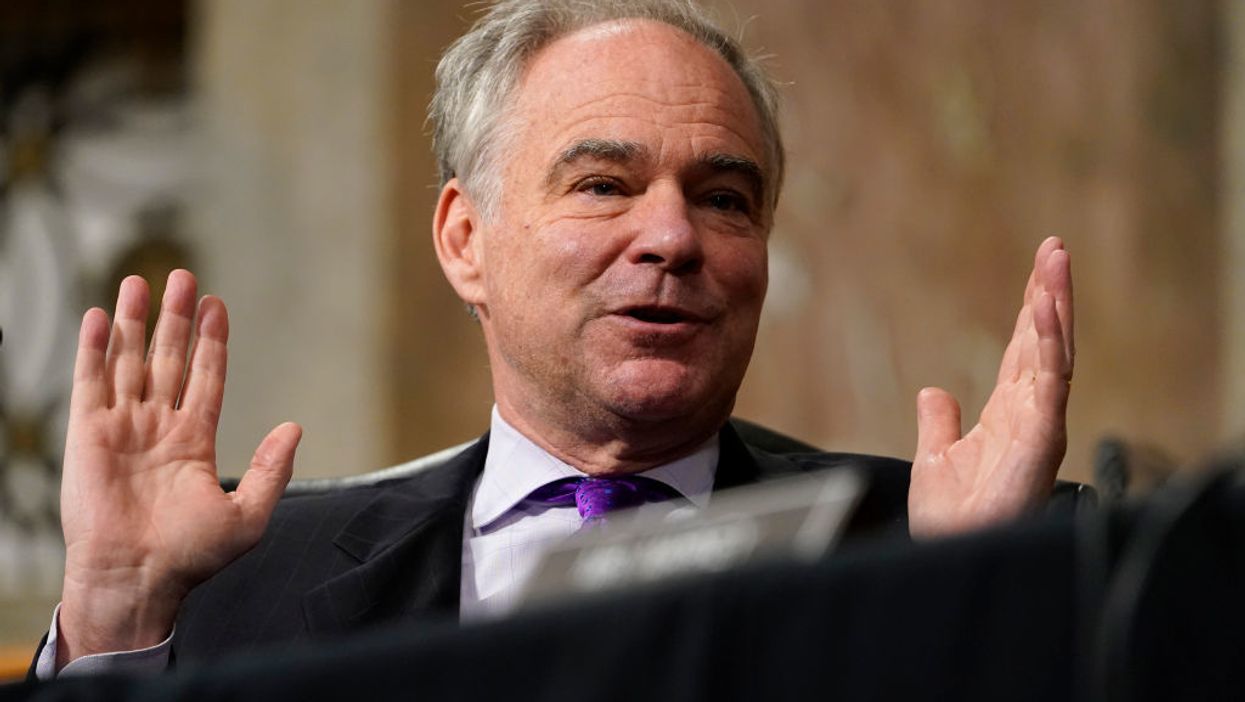
Susan Walsh-Pool/Getty Images

Would FDR agree?
As Democrats and the Joe Biden presidential campaign hover between refusing to answer the question on packing the Supreme Court or redefining what "packing the courts" means, one Senate Democrat says it's none of Biden's business anyway.
Speaking Monday on Fox News, Sen. Tim Kaine (D-Va.) said the reason Democratic nominee Joe Biden won't give his opinion on packing the courts is because it's "not his business." He argued that under the Constitution it is Congress, not the president, who dictates the composition of the Supreme Court by law.
"Why won't he answer that question?" host Bill Hemmer asked Kaine.
"Well, I haven't asked him but I have a pretty good idea, Bill. Because it's not his business, the Constitution gives no power to the president or vice president to pack the court," Kaine said.
"It's not a presidential responsibility. Congress, according to Article I of the Constitution, sets the composition. So that's why it's not even a part of the campaign plan," he continued.
Several progressive Democrats have argued that if Senate Republicans are successful in confirming Judge Amy Coney Barrett to fill the current vacancy on the court, the next Democratic Congress and president must expand the court to undo a potential 6-3 conservative majority.
Last Thursday, Biden again refused to answer the question when confronted by a reporter about his position on packing the Supreme Court.
"You'll know my position on court packing when the election is over," Biden said.
"You know, the moment I answer that question, the headline in every one of your papers will be about that, other than focusing on what's happening now. The election has begun. There's never been a court appointment once an election has begun," he added.
Biden's running mate Sen. Kamala Harris (D-Calif.) likewise dodged the question during her debate with Vice President Mike Pence last week, instead attacking President Trump for making 50 court of appeals appointments and not nominating any black judges.
Other Democrats have attempted to redefine the term, accusing Republicans of "court packing" by filling court vacancies with President Trump's nominees. Traditionally, "packing the court" refers to expanding the number of seats on the court to create a more favorable ideological makeup of the bench, not filling vacancies, which is the constitutional duty of the president and the Senate.
Biden himself pointed out in a 1983 Senate Judiciary Committee hearing on nominations to the U.S. Commission on Civil Rights that the origins of the term "court-packing" go back to Democratic President Franklin D. Roosevelt's threat to expand the Supreme Court after several of his New Deal programs were ruled unconstitutional.
"President Roosevelt clearly had the right to send to the United States Senate and the United States Congress a proposal to pack the court. It was totally within his right to do that. He violated no law. He was legalistically, absolutely correct," a 40-year-old Biden told the commission. "But it was a bonehead idea. It was a terrible, terrible mistake to make. And it put in question, if for an entire decade, the independence of the most-significant body … in this country, the Supreme Court of the United States of America."
Sen. Kaine was asked about Biden's 1983 comments, which suggest that the composition of the court is, in fact, a president's business.
"You haven't heard Joe Biden say he wouldn't send a plan to the court — I don't think this is a matter for the president at all," Kaine said, likely misspeaking as a president would send a court packing plan to Congress, not the court.
Kaine then accused Republicans of making two "momentous changes" to the way the court is composed, warning "they're about to make a third."
"The first was they refused to entertain the nomination of Merrick Garland, depriving President Obama in a historic way of being able to fill a position," Kaine said. "Second, we used to require that a Supreme Court justice get 60 votes, a bipartisan measure of support, and we thought that was a good idea — Democrats thought that was a good idea, the Republicans changed that to elevate Neil Gorsuch to the court."
The third change, Kaine argued, would be hypocritically confirming Barrett during an election year after refusing four years ago to give Garland a hearing.
Kaine did not mention that it was then-Democratic Senate Majority Leader Harry Reid (D-Nev.) who first ended the filibuster for circuit court level judicial nominations, creating the precedent that Republican Senate Majority Leader Mitch McConnell (R-Ky.) invoked in ending the filibuster for Supreme Court nominations.
Prompted by Hemmer, Kaine also predicted that Barrett will have enough votes to be confirmed to the Supreme Court before the election on Nov. 3 but said he hopes the confirmation hearings will persuade some Republicans to change their votes and the next inaugurated president fill the court vacancy.